Public Investing

Product Name: Public Investing
Product Description: With the Public Investing app, you can invest in stocks, bonds, ETFs, options, Treasurys, crypto and more, including fractional shares.
Summary
Public was founded in 2017 and started out as the Matador investing app. When the company decided to rebrand as Public, it cleaned up its app and made it easier to use. They still focus on their primary goal: to help open investing to a broader audience by making stock purchases more affordable.
Overall
Pros
- $0 minimum account balance, no commissions
- Ability to buy fractional shares in real-time
- Referral program to earn free stock
- Offers alternative investments such as crypto and collectibles
Cons
- Largely self-directed trading platform
- No free trial for Public Premium
- No day trading (account will be subject to restrictions)
Successful investors like Warren Buffett and Jim Collins will tell you there’s great money to be made by investing in the stock market. Unfortunately, not everyone has the bandwidth to buy whole shares of stocks in successful companies. This is where the Public investing app comes in.
Public helps make investing possible for a larger audience of people. In this Public review, I’ll cover what Public has to offer, so you can see if using the Public Investing app might be a good way for you to start investing.
At a Glance
- Investing app offering stocks, Treasurys, ETFs, crypto, and alternative assets.
- Offers fractional investing, so you can buy “slices” of stocks, ETFs, crypto, and more.
- Community-focused platform in which you can see what other members are trading.
Who Should Use Public Investing?
Like other commission-free brokerages, the Public Investing app can be a good way to start investing affordably. The ability to buy fractional shares makes it very useful for new investors who don’t have a lot of money to commit to the markets.
There is also a strong social element to Public, with the ability to interact with the community and feel like it’s more than just a place to buy and sell shares (or slices of shares).
To be eligible to open an account with Public, you must be 18 years of age or older, have a valid U.S. Social Security number, have a legal U.S. residential address, and be a U.S. citizen, a U.S. permanent resident, or have a resident visa.
Public Investing Alternatives
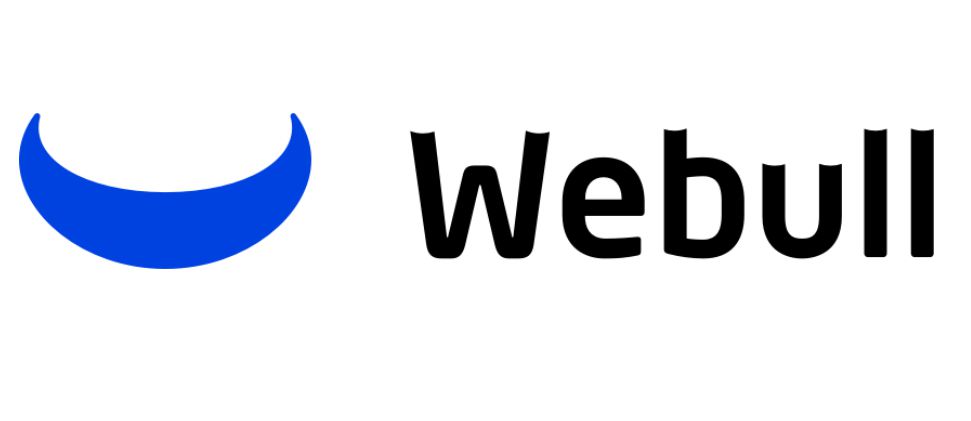 | 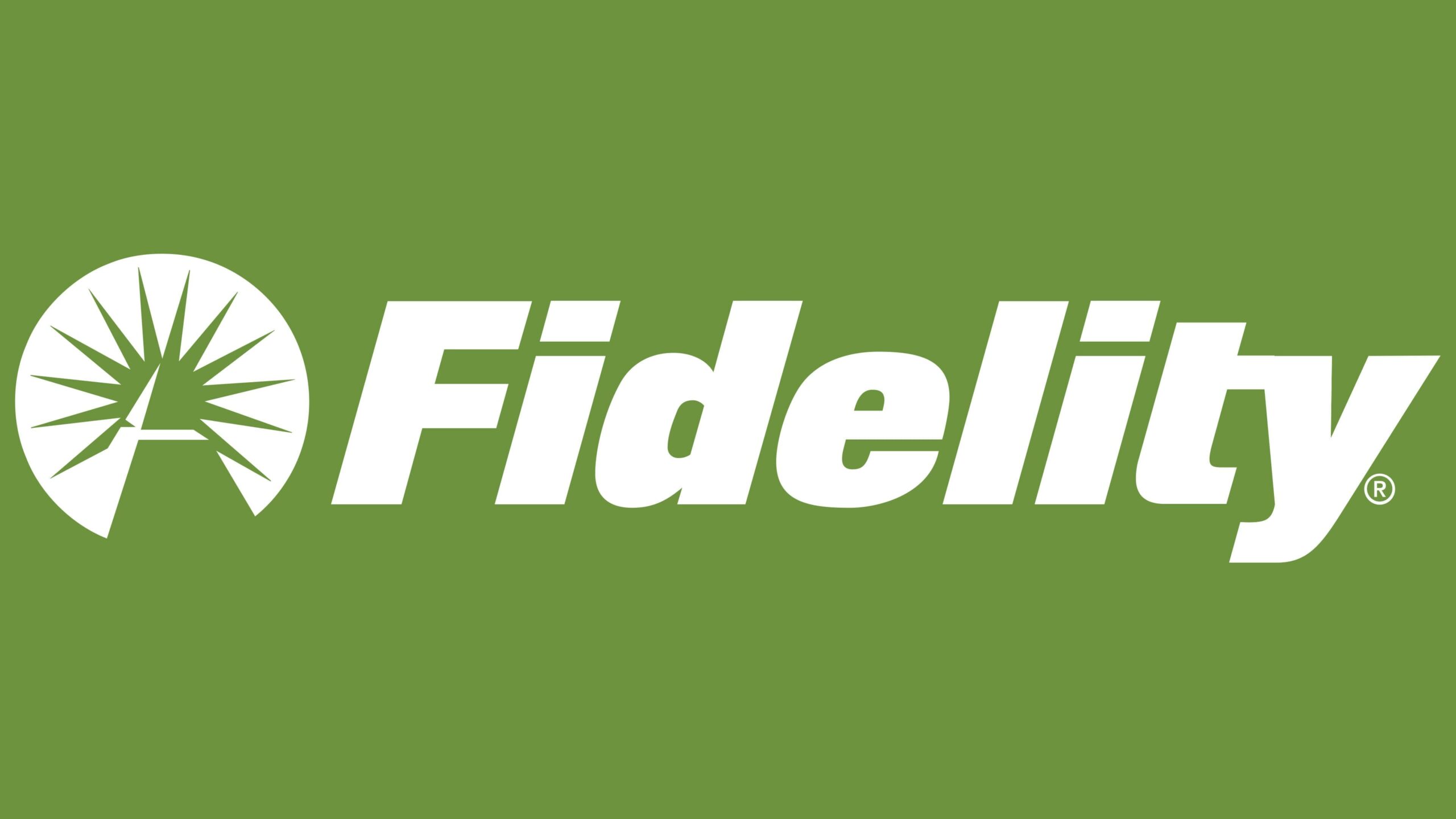 | ||
| Minimum initial investment | $0 to open a brokerage account; $5 for fractional shares | $0 to open a brokerage account; $1 for fractional shares | $0 to open a brokerage account; $1 for fractional shares |
| Trading fees | $0 commission fees on U.S.-listed stock, ETF, and options trades | $0 commission fees on U.S.-listed stock, ETF, options, and crypto trades | $0 commission fees on stock, ETF, and options trades |
| Fractional shares | Yes | Yes | Yes |
| Learn More | Learn More | Learn More |
Table of Contents
- At a Glance
- Who Should Use Public Investing?
- Public Investing Alternatives
- What Is Public Investing?
- How To Open a Public Investing Account
- How To Invest With Public
- Public Investing Pricing
- Other Public Investing Features
- Public Investing vs. Webull
- Public Investing vs. Robinhood
- Public Investing vs. Fidelity
- FAQs
- Summary
What Is Public Investing?
Public got its start with a focus on fractional investing — allowing you to buy “slices” of stocks, ETFs, crypto, and more, instead of purchasing whole shares of these types of investments.
Since then, it has significantly expanded its product line-up and now offers options trading, corporate bonds, Treasurys, collectibles, royalties, and even a high-yield cash account.
It also includes a community feature that lets you connect with other investors and see what they’re trading.
The minimum to open your Public account is $0, so you can start your Public account for as little as you want. Fractional shares require a minimum $5 investment.
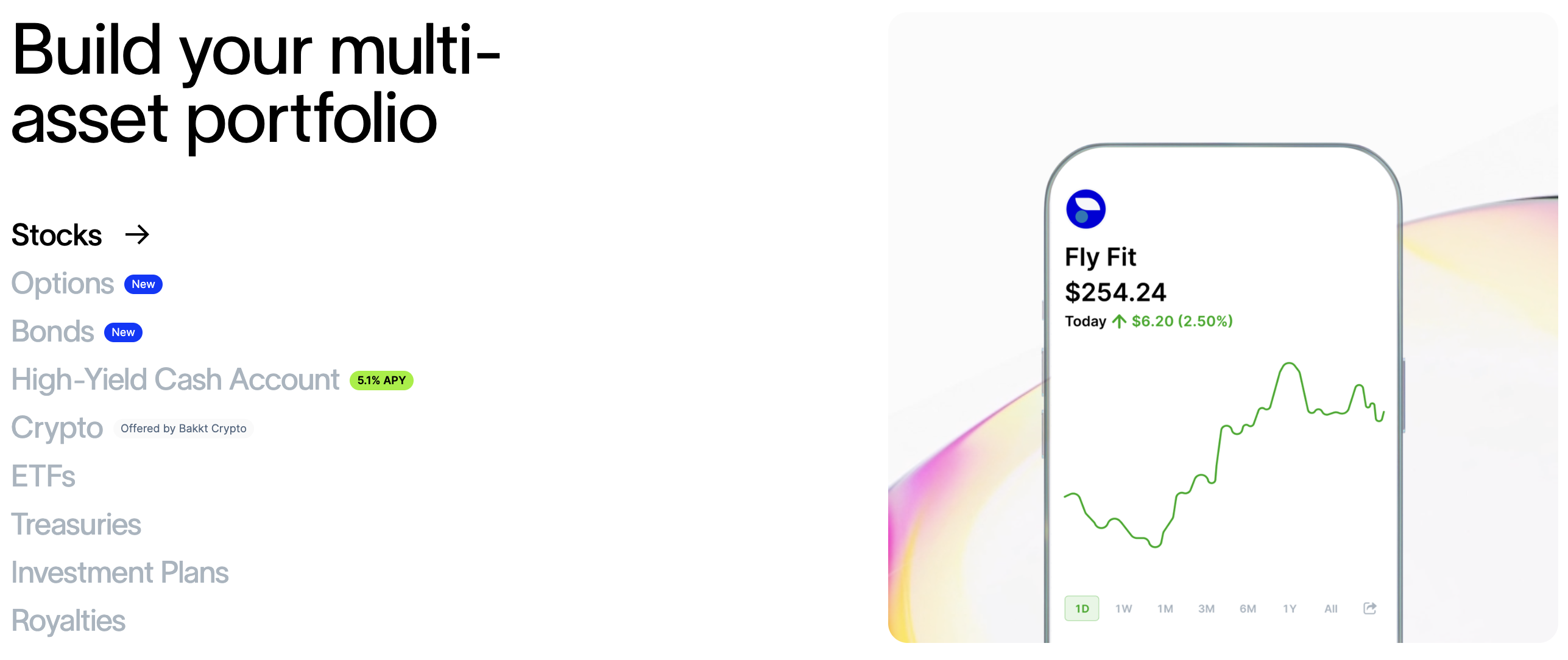
Public recently launched in the UK, the company’s first international market. UK members can invest in 5,000+ U.S. stocks with industry-leading FX fees (0.30% on deposits and withdrawals only) and commission-free trading.
How To Open a Public Investing Account
Public is easy to use — even for beginner investors. From the Public home page, you’ll go to the “Get Started” button. From there, you’ll either be prompted for your name, email address, and phone number, or you’ll have the option to download the app via QR code.
After your account is opened, you’ll link your Public account to your bank account, so you can start depositing money into your Public account. Then you’re ready to invest.
How To Invest With Public
Once your account is opened and you’ve deposited money into it, you’ll be asked to select your interests.
You can choose from various categories, such as Tech Giants or Media and Entertainment, or you can choose to follow a specific investor in the Public community. Choosing your interests can help you connect with like-minded people.
However, you can always use the search icon on the app to find specific stocks in any business category.
When you find a stock you want to purchase, you simply enter the amount of money you want to invest in that company’s stock. Public purchases it for you, and you’re on your way.
Stocks and Options Trading
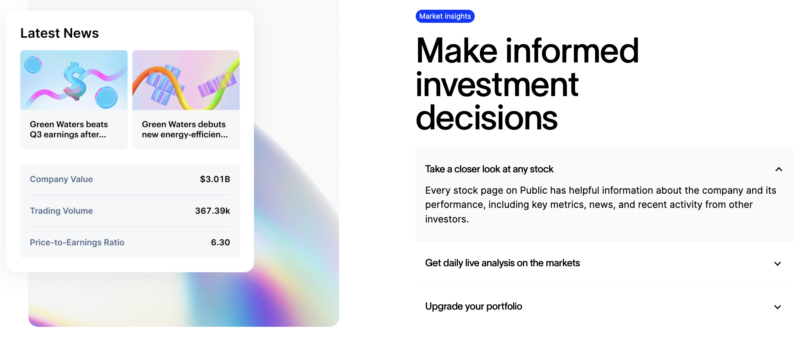
Public offers more than 9,000 equities and more than 300 over-the-counter (OTC) stocks that focus predominantly on large-cap international companies. In addition to buying full shares, you can also buy fractional shares of selected securities, with a minimum investment of $5.
For instance, let’s say you want to invest in a company like Chipotle.
As of this writing, Chipotle stock shares sell for just over $2,900 each. But even if you’re interested, you might not have $2,900+ to buy a share of Chipotle stock now.
With Public, you can buy a “slice” of a stock share in Chipotle for as little as $5. Public’s $5 minimum price for share slices makes investing more affordable to a larger group of people than traditional per-share stock purchases.
Public also recently launched options trading, with an $0.18 rebate per contract traded with no commission and no per-contract fees — something no other brokerage is currently doing.
Alternative Investments
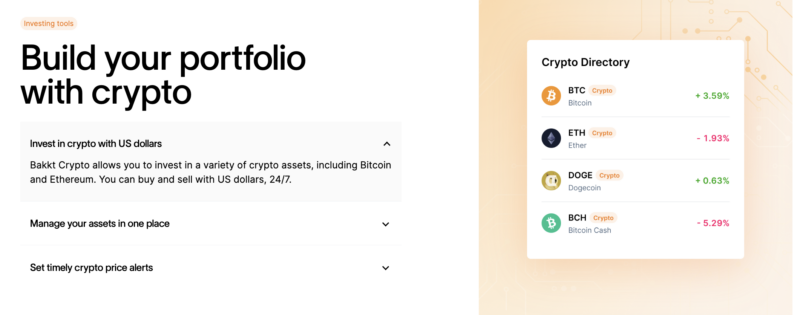
Public also offers several alternative investments for those who want to diversify their portfolios away from just the traditional markets:
- Crypto: You can invest in 7 cryptocurrencies with Public (Bitcoin, Ether, Shiba Inu, Dogecoin, Litecoin, Bitcoin Cash, and Ethereum Classic).
- Alternative assets: The wealthy often invest in alternative investments (Alts) such as art and collectibles. With Public, you can invest in Alts with fractional shares. For example, as of this writing, Public is offering investments in a pair of game-worn Michael Jordan high tops. The shoes have an initial offering value of $381,500, and 70,000 shares are offered at $5.45 each.
- Music royalties: Investing in shares of royalties can earn you passive income from an asset class that typically performs independently from traditional markets. Public recently launched its royalties investments with the Reg A+ IPO of the Shrek Franchise Original Music, and says they’re planning to release more
As with any investment, investing in cryptocurrencies or alternative investments does come with a risk of loss of your entire investment.
In addition, there are fees associated with investing in alternative investments on Public.
Fixed-Income and Savings Products
If you’re looking for a safer investment that offers a more predictable return, you may want to consider investing in a bond or putting your cash into a high-yield savings account.
Public currently offers corporate bonds and Treasurys, and says they’ll soon offer municipal bonds as well.
- Corporate bonds: Public’s corporate bond pages include key financial metrics, such as cash flow and debt-to-equity ratio, to help you choose your investments.
- Treasurys: The yield as of publishing on a Public Treasury account is 5.3%, and you can sell your Treasury Bills anytime. There is no penalty to sell before the T-Bill reaches maturity.
- High-Yield Cash Account: With Public’s high-yield cash account, you can earn 5.1% APY as of publishing. There are fees, no minimum or maximum balance limits, and you can make an unlimited amount of transfers and withdrawals. The account is FDIC-insured up to $5 million.
Public Investing Pricing
In most instances, trading stocks with the Public app is free. You won’t pay anything to open your account, and you won’t pay anything to trade stock slices.
However, there are some other fees the company has that you should be aware of:
- If you transfer your entire Public account to another brokerage, you’ll pay $75
- Paper statements are $5
- Domestic wire transfers out of your account are $25
- Domestic overnight checks are $35
- Returned checks, stop payments, wires, or ACH transfers are $30
There may be other fees for special services, too; however, basic trading is free, and there are no monthly or annual service charges. Also, some trades might incur small fees on occasion.
Note that there’s no fee (from Public) to transfer money from another brokerage account to Public. If the brokerage you’re transferring from charges you a fee, tell a Public customer service rep about it; they may cover the fee for you.
Public Premium
Public Premium is a subscription-based upgrade Public users can sign up for. When you upgrade to Public Premium, you’ll pay $8 per month to access features such as:
- Advanced stock and ETF insights
- Free extended hours trading
- Expert ratings, reports, and insights from Morningstar
- Expanded portfolio management tools
- Subscriber-only content
- VIP member support
- Early access waitlist
- Price alerts for stocks and crypto
Public Premium is free to account holders with a balance of at least $20,000. There are no free trials with Public Premium, but you can cancel anytime.
Other Public Investing Features
Public offers several other products designed to enhance the investing experience. Here are some other key features you can expect with Public.
Investment Plans
Public recently launched a suite of Investment Plans. These are a collection of assets you can purchase on a regular basis. Public’s Plans catalog covers various investing styles and risk tolerances. You can also build your own Investment Plan from scratch with up to 20 stocks, ETFs, and crypto.
Alpha
Alpha is Public’s AI exploration tool — “your investing co-pilot.” With Alpha, you can access real-time and historical information about thousands of stocks, ETFs, crypto, and more, by swiping down on any asset page.
Alpha also offers earnings call summaries, the market’s top movers, and detailed stock analysis, like buy and sell ratings.
ACAT transfer bonus
If you transfer your funds from another brokerage account into Public, you can earn up to a $10K bonus. Starting at transfers of $5K+, you can earn a bonus ranging from $150 to $10K.
Community
The Public Investing app thrives off of its community. When you become a Public member, you can see what other members are trading and learn from subject matter experts in the community too.
Once you’ve selected your favorite stock interest category, you’ll get a watch list showing you how stocks are performing. These tools can keep you up to date on investment happenings.
By studying community members and subject matter experts, you can learn more about the dos and don’ts of investing.
Referral Program
Public has a referral program as well. You can earn free stock when you refer friends or family members who open accounts and trade on Public.
Public Investing vs. Webull
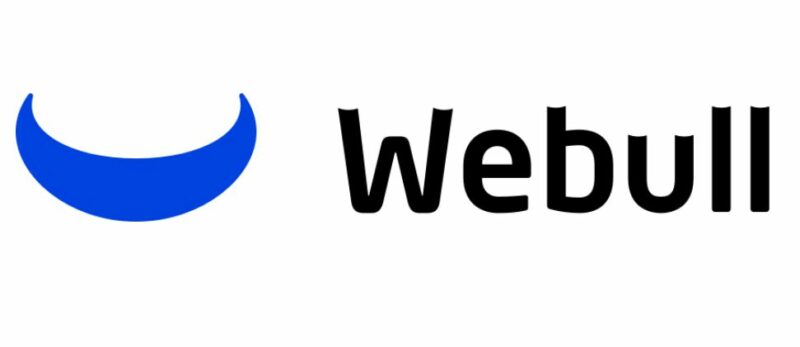
Webull lets you trade stocks, ETFs, crypto, and options, similar to Public Investing. Also like Public, trading is commission-free, and the minimum investment is $5 for fractional shares. Webull recently started offering cash management accounts and a robo-advisor service.
Both platforms are designed for self-directed investors — although if you’re a new investor, Public wins out over Webull for its emphasis on its community, which you can tap into for insights and support.
Public Investing vs. Robinhood

Robinhood was one of the first online brokerages to offer commission-free trades and is popular with beginners since it’s so easy to use and has no account minimums. Like Public, it also offers crypto and options trading, but unlike Public, it doesn’t offer any fixed-income investments or alternative assets.
You can buy $1 fractional shares of stocks and ETFs with Robinhood, which is cheaper than with Public Investing.
Read our full Robinhood review.
Public Investing vs. Fidelity
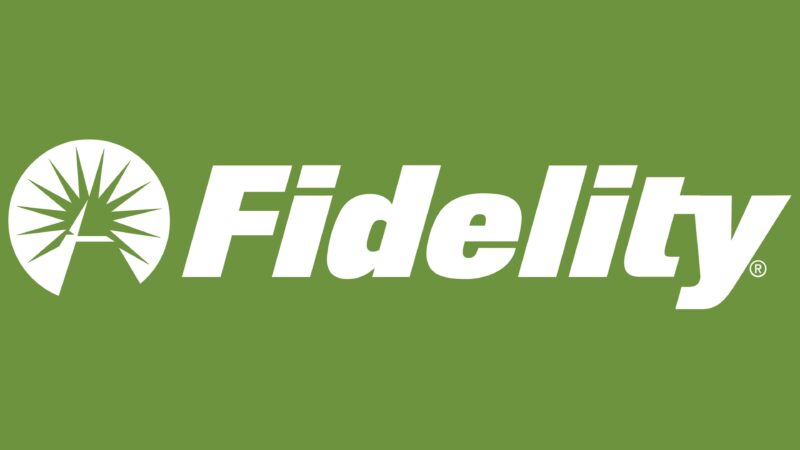
Fidelity Investments is a full-service online brokerage and is suitable for beginner and advanced investors alike. Trades are commission-free for U.S.-listed stocks, ETFs, and Fidelity mutual funds. You can trade crypto, but you have to open a separate Fidelity Crypto account.
While Fidelity does offer fractional investing, you can currently only trade stocks by the slice through the Fidelity mobile app. However, there’s only a $1 minimum investment versus Public’s $5 minimum.
Fidelity also offers bonds and a cash management account.
FAQs
The Public investing app is safe and secure. Your investments are insured by the SIPC (Securities Investor Protection Corporation) for up to $500,000 per individual account. Public uses AES 128-bit encryption and TLS 1.2 to secure your data.
Public makes money in a few ways. Firstly, it lends out shares of stock to people who want to short them and gets paid for it. Public also earns money by investing their cash balances and through “smart order routing” — meaning the clearing firm sells your shares to certain people. You should always get the best price, but Public gets transaction rebates. Finally, Public also makes money by offering Public Premium.
Public investing accounts aren’t meant for day trading. Public account holders who participate in frequent day trading run the risk of getting their accounts restricted.
Summary
As with any investment, the stocks you purchase using Public can lose money. That’s just part of the process when it comes to investing. If you’re comfortable with the risks, the Public app can help you invest in stocks while avoiding per-trade fees.



